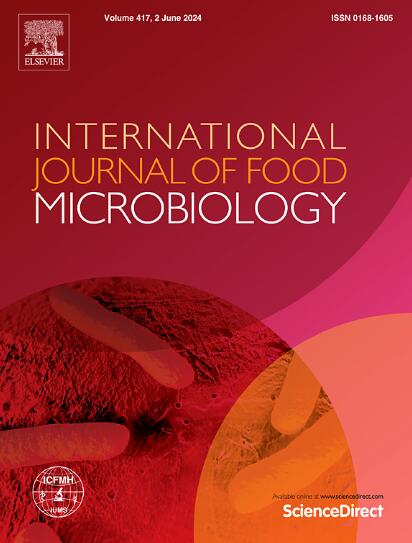Butyrogenic and caprogenic bacteria from pit mud of strong-aroma baijiu engage in mutualistic cross-feeding and promoting caproic acid biosynthesis
IF 5.2
1区 农林科学
Q1 FOOD SCIENCE & TECHNOLOGY
International journal of food microbiology
Pub Date : 2025-09-09
DOI:10.1016/j.ijfoodmicro.2025.111434
引用次数: 0
Abstract
The stable production of caproic acid is a key limiting factor affecting the production consistency and quality of strong-aroma baijiu. In this study, a microbial consortium capable of stably enhancing caproic acid production, Caproicibacter sp. BJN0012 and Clostridium sp. BJN0013, was developed. The interaction between the two strains was a cooperative relationship of metabolite exchange. In co-culture fermentation, the genes within the reverse β-oxidation pathway in strain BJN0012 were significantly upregulated, together with a 15.31-fold increase in caproic acid production. The butanoate metabolism was significantly altered, and butyric acid produced by strain BJN0013 served as a critical substrate for enhancing caproic acid production by strain BJN0012. The strain BJN0012 synthesized more arginine and histidine, significantly promoted the biomass accumulation and cell stability of strain BJN0013. The elucidation of the interaction mechanism provided a foundational basis for constructing controllable core acid-producing microbial consortium for strong-aroma baijiu fermentation.
浓香白酒窖泥中产丁酸菌和产己酸菌相互交叉喂养,促进己酸的生物合成
己酸的稳定生产是影响白酒生产一致性和质量的关键限制因素。在本研究中,开发了一种能够稳定提高己酸产量的微生物联合体——Caproicibacter sp. BJN0012和Clostridium sp. BJN0013。两菌株之间的相互作用是一种代谢物交换的合作关系。在共培养发酵中,菌株BJN0012 β-氧化反向通路内的基因显著上调,己酸产量增加了15.31倍。丁酸代谢显著改变,菌株BJN0013产生的丁酸是菌株BJN0012产生己酸的关键底物。菌株BJN0012合成了更多的精氨酸和组氨酸,显著促进了菌株BJN0013的生物量积累和细胞稳定性。相互作用机理的阐明,为构建可调控的白酒发酵核心产酸菌群奠定了基础。
本文章由计算机程序翻译,如有差异,请以英文原文为准。
求助全文
约1分钟内获得全文
求助全文
来源期刊
CiteScore
10.40
自引率
5.60%
发文量
322
审稿时长
65 days
期刊介绍:
The International Journal of Food Microbiology publishes papers dealing with all aspects of food microbiology. Articles must present information that is novel, has high impact and interest, and is of high scientific quality. They should provide scientific or technological advancement in the specific field of interest of the journal and enhance its strong international reputation. Preliminary or confirmatory results as well as contributions not strictly related to food microbiology will not be considered for publication.

 求助内容:
求助内容: 应助结果提醒方式:
应助结果提醒方式:


